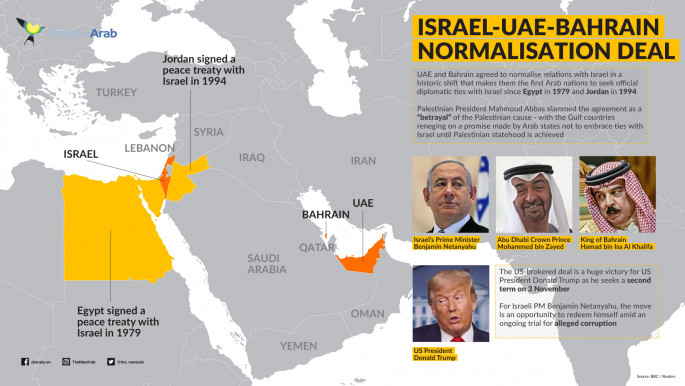
Recycling Failure: Normalisation, annexation, and the legacy of the Oslo Accords at 27
In early September, the leading Palestinian political parties held an unprecedented meeting in Beirut and Ramallah. The video conference included the different factions of the Palestine Liberation Organization (PLO) as well as Hamas and Islamic Jihad. But what should have been a new beginning for the Palestinian national liberation movement, instead revealed the lack of a strategy or vision forward.
The repetitive speeches from a parade of graying political figures did little to inspire hope that the current Palestinian leadership can challenge Israel's occupation and annexation or its normalisation of ties with the Arab states. While the Palestinian leadership behaves as if time is on its side, the conference demonstrated that it is running out.
Twenty-seven years ago, the PLO and Israel signed the Declaration of Principles (Oslo Accords) on the White House lawn. Like many Palestinian refugees, I watched the elaborate ceremony on television in Lebanon and wondered if my mother and father would finally be able to return to Nazareth and be reunited with their siblings and cousins.
Almost three decades later, we know the answer. Instead of another White House ceremony to announce the creation of an independent Palestinian state and the return of Palestinian refugees, the Trump administration will celebrate this week the establishment of formal diplomatic relations between the United Arab Emirates (UAE) and Israel.
With Washington’s support, Israel has expanded its open and secret relations with the Arab Gulf States. Meanwhile, the Palestinian leadership is recycling failure. Palestinian Authority President Mahmoud Abbas has declared that he wants to resume negotiations with Israel under the auspices of the Quartet – the United States, the European Union, Russia, and the UN Secretary General.
 |
Whatever the outcome of the US Presidential election in November, there is little evidence that the Quartet will be more effective in a Biden administration than it was in the past |  |
Flogging a dead horse
Created during the second Palestinian intifada by the George W. Bush administration, the Quartet provided diplomatic cover to failed negotiations and strengthened Israel’s occupation. Abbas apparently believes that if the Democratic Party nominee, former Vice President Joe Biden, is elected this will provide a needed boost to negotiations with Israel and reinvigorate the Quartet. But whatever the outcome of the US Presidential election in November, there is little evidence that the Quartet will be more effective in a Biden administration than it was in the past.
|
||
Yet it is in the US presidential elections that the Palestinian leadership has again placed its hopes. As a further indication of the absence of vision and strategy, the current Prime Minister of the Palestinian Authority in Ramallah, Mohammad Shtayyeh, said recently that he hopes a new Biden administration would reverse the decisions made by President Trump. However, Biden has already announced that if elected, he will not rescind Trump’s decision recognising Jerusalem as Israel’s capital.
Biden has also praised the agreement between the UAE and Israel. Like the Barack Obama administration, where Biden served as vice president, the differences may only be cosmetic. While a Biden administration may adopt less hostile rhetoric toward the Palestinians and the Palestinian Authority, its policies are unlikely to differ from those of the United States for the past 27 years of negotiations under the Oslo Accords or since Israel was created in 1948.
Read also: As Arab countries edge towards Israel, what's next for the Palestinian national movement?
This should not be news to Mahmoud Abbas. Even though his term in office ended in 2009, Abbas has continued to serve as President of the Palestinian Authority without elections or accountability. Biden would be the fourth American President Abbas has placed his faith in.
Yet following the Ramallah-Beirut conference, and considering his advanced age and ill health, Abbas did not act with renewed urgency. The outcome of the meeting was not new elections or even the formation of a national unity government. Instead, Abbas created a committee to present a strategic vision to end division and reconcile the Palestinian political parties within five weeks.
 |
Unable to break the siege on Gaza, Hamas has few options left. |  |
Hamas and Fatah: A dead end?
But this is not the first time this has been promised in the 13 years since Hamas seized control of Gaza. There have been numerous agreements to resolve the split between Abbas’s Fatah and Hamas, but they have never been implemented. And the geographic and political divide between them remains deep.
Unable to break the siege on Gaza, Hamas has few options left. Over the past few years, Hamas has cultivated relations with Mohammad Dahlan, the former security chief for Gaza and rival of Mahmoud Abbas. Since going into exile, Dahlan has become a security consultant to UAE Crown Prince Mohammed bin Zayed and has ties across the region. It is uncertain what role Dahlan played in the agreement between the UAE and Israel, but it is a clear warning to Hamas and Fatah that a new order is emerging.
Palestinians living in the Arab states are experiencing that new order today. Political activity is closely monitored and criticism of normalisation with Israel is actively discouraged. Even the attempts to challenge normalisation at the Arab League, once a pillar of support for the Palestinians, have failed. With the Palestinian Authority financially dependent on donors and Israel for survival, the leadership is unable to challenge annexation and normalisation.
Led by Abbas, the Palestinian leadership will not reform or step aside. Nor will they accept responsibility for their failings. Instead they promise more of the same: false hopes, broken promises, and the constant threat of violence and destitution.
After twenty-seven years this is what the Oslo Accords have achieved for Palestinians.
Dalal Yassine is a Non-Resident Fellow with the Jerusalem Fund/Palestine Center in Washington, D.C.
Follow her on Twitter: @Dalal_yassine
Opinions expressed in this article remain those of the author and do not necessarily represent those of The New Arab, its editorial board or staff.




